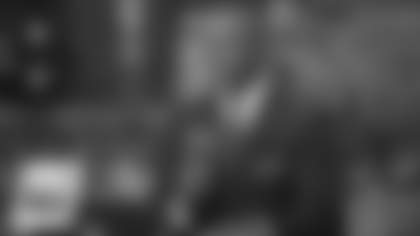EAST RUTHERFORD, NJ
Q: Two weeks ago you were coming off two lopsided losses. Since then, you've had two convincing victories. How did you read your team then after the losses and how did you get it turned around?
Coughlin: "We just simply thought about the facts, where we were, and what I felt we had to do was come closer as a team - to understand more about how to manage the game, how all three phases needed to really support one another in the course of the game, whether it be field position with the special teams or whatever. We stuck to our guns. We stuck to what we believed in. We went back to work. We grinded it out. We had a couple of really good weeks of practice, and we continued to believe in ourselves. We didn't have a lot to show for it, but we felt that we are a good team and that if we could control some of the areas that we felt needed to come under control and specifically meet the objectives of each particular game, and then work together, not as three different units but as one, supporting one another, doing a great job on the sidelines, sharing the joy in individual outstanding plays - that type of thing - that we could get it to turn around. Now we still haven't pulled all the areas together. Obviously, the turnovers and the penalties, last week with special teams, but the aggressiveness I like. The fact that defensively we've played very well for two weeks in a row. Last week, offensively we gave ourselves a chance to play the kind of style of defense we want to play because we scored quickly, scored often, got a big lead. And so the question of how they wanted to play in Houston after they were down 24-3 went back to them. The run was altered, and at the end of the day there were 15 runs (by the Texans)."
Q: When the team was 1-2, everybody looked to you. Were you cognizant of just staying the course?
Coughlin: "The idea that they look to their coach for direction, for leadership, sure, absolutely. And the message was strong and clear that it was one of unification. It was one of staying the path. It was one of understanding that it was a confidence thing. You've got to get to where you have some success. It takes time. It takes repetition. It takes obviously doing well, but we knew exactly what we were up against and the players felt the same way."
Q: When you were talking about turnovers in your news conference Wednesday, you said, it has to stop. Were you talking about the turnovers in general or Eli Manning's interceptions after he threw two last week?
Coughlin: "The turnovers, all the turnovers. If we can play the kind of football we know we can play, and no matter what the circumstance in the game is, do not give the opponent an opportunity to get a lift because of something we've done to hurt ourselves, then we give ourselves that much greater of an opportunity to win. It can be done. We've done it around here. I'm not talking about taking the aggressiveness away or the competitiveness away from our team - from Eli, from anyone - but I'm saying that under circumstances of which we have control, you have to be able to assess whether or not the risk is worth the reward. And if it isn't, then we'll punt the ball. We don't have a problem with that, especially when you're sitting with the lead."
Q: The Giants are second in the NFL with 15 giveaways. Your opponents this week, the Detroit Lions, are tied for first with 14 takeaways…
Coughlin: "They're ranked very high in sacks as well."
Q: I know you emphasize the importance of turnovers every week, but is it safe to assume that you made those numbers a point of emphasis with your team?
Coughlin: "No, I did not point it out. I simply kept it to myself."
Q: Okay, very funny. Did you put particular emphasis on it this week?
Coughlin: "Yes, I did. The fact that this is a team that has had great success turning the ball over and it is 14 - seven (interceptions) and seven (fumble recoveries)."
Q: How are they doing it?
Coughlin: "They're aggressive. (Alphonso) Smith has three interceptions from the one corner spot. They've got a string of guys that have done a good job with that. So they've been very aggressive. They've had the right guy at the right place at the right time. They've covered well. They've pressured the quarterback, and they've covered well. They've covered with their corners. They've covered with their nickel. They've been very aggressive."
Q: One area where the team has been very good is first down. Defensively, you're first in the league in yards allowed on first down (3.60) and offensively you're third in yardage gained (6.32)…
Coughlin: "Last week was a tremendous emphasis on - we played a team (Houston) that had a very high percentage on third down, and it was because they had been able to keep the third down situations very makeable. So first down was a huge down for the Texans, and therefore it was a huge down for us to try to hold them. And we did. I think nine of the 11 third downs that they faced last week were third-and-seven or more, which was a huge plus. And then for two weeks in a row, we've played the number one rush team in the league and the number two rush defensive team in the league, and in so doing, that put more emphasis on us to be able to put ourselves in a situation on first down where we definitely had to create some kind of yardage so that we weren't behind the eight ball on second down."
Q: I guess it's simplistic to say when you succeed on first down, it makes third down a whole lot easier.
Coughlin: "Well, that's the idea. That's the idea of keeping it makeable."
Q: Defensively, you have frequently played your three safeties – Antrel Rolle, Kenny Phillips and Deon Grant - together a lot with success. Was that your idea going into the season? Or was that something that has evolved because you saw how well it's worked?
Coughlin: "We have an emphasis on different personnel combinations, and naturally there's some experimentation with it. And you do that a little bit in training camp and get some thoughts along those lines, and it's just manifested itself to being able to utilize those three players at one time. The experience factor coming from Grant, obviously, and then being able to tie it all together with one particular personnel group to be able to take advantage of the coverage aspect that Deon Grant brings to that quote-unquote "linebacker position."
Q: Are you at all concerned physically how he'll hold up playing the linebacker position?
Coughlin: "No, because most of the time that's usually on a general pass down. Sometimes you're going to get some runs on that, but he can hold up there."
Q: Barry Cofield said this week he felt he played at maybe 75 percent last season because he was coming off knee surgery. Now he said he's healthy. Do you see the difference when you look at him on tape?
Coughlin: "Yes. He played very well last weekend. The whole front played extremely well - had to, to be able to enforce the type of plan we wanted to put in play in order to have an opportunity to shut down the very unique and outstanding running game that they had. So he played very well. (Chris) Canty played well. The two ends played very well. So the front led the charge, and he has played well."
Q: What makes Calvin Johnson a unique wide receiver?
Coughlin: "His ability to take the ball off the top of the heads of the corners that he plays, in particular when you're talking about the red zone. He's been outstanding in that regard."
Q: And what do you see from Jahvid Best?
Coughlin: "Quickness, speed, acceleration, the ability to make the big play, to go the distance, whether it's a 75-yard screen pass, catch the ball out of the backfield, hit on a draw or a cutback run. He's really given a real spark to their offensive team."
Q: We've talked about your defensive front, but with Kyle Vanden Bosch and Ndamukong Suh, Detroit has a strong front, too, do they not?
Coughlin: "That's their strength. They have four very good people up front who are powerful. They have good size. They are attackers. They're very much penetrators. They've got their ears pinned back. They're coming after you. They certainly have played well."
Q: A little trivia for you. Their kicker, Jason Hanson, is one of the three players that you faced in your first year in 1995 who is still active…
Coughlin: "Thanks a lot. I appreciate those kinds of facts."
Q: Is he still as good as he was in his 19th season?
Coughlin: "Still performing. He's still kicking the heck out of the ball. As a matter of fact, he's four-of-five from 40-49 yards and one-of-two from 50 and out. Obviously, he plays indoors a good part of the time, but he's done an outstanding job, and he's extremely effective."
Q: The media has portrayed this as a so-called trap game, since the next game is on Monday night in Dallas. But you don't buy the trap game theory, do you?
Coughlin: "Have we ever gone out and not played as well as we should play? Yes. But I'm going to tell you the first thing I did Wednesday morning is I showed them the end results of three of Detroit's games. In Chicago, the score is 19-14 and they appeared to score the winning touchdown (the officials ruled otherwise). Touchdown – game, set, match. Against Philadelphia, it's 35-17. Two minutes later it's 35-32, and they're going to get the ball back again. They onside kick, get the ball, and can't go score. Same thing with Green Bay. They got the ball when it's 28-26. It's on the 38-yard line. They make one yard. Two passes go incomplete and they punt the ball. They've outscored their opponents, and they're 1-4. They average 25 points a game. They're a very good football team."
| Join the Giants on |





